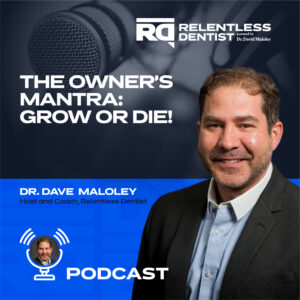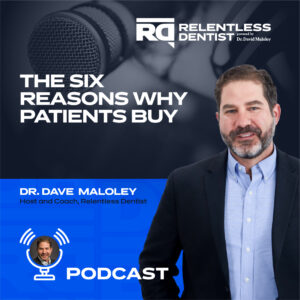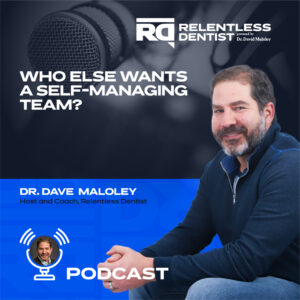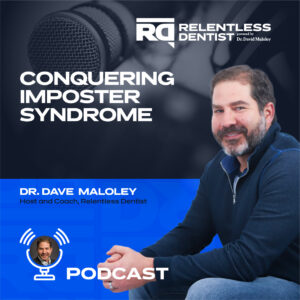by [email protected] | Mar 23, 2022 | Prescriptions for your Practice
Podcast: Play in new window | Download
 I might hear you say, “That’s quite a statement, Dr. Dave.” Well, let’s put it subtly. If you’ve been religiously listening to my podcast, you’ve been hearing me say this countless times that it’s become my business mantra: “Practice isn’t limited by its opportunity; It’s limited by its leader.”
I might hear you say, “That’s quite a statement, Dr. Dave.” Well, let’s put it subtly. If you’ve been religiously listening to my podcast, you’ve been hearing me say this countless times that it’s become my business mantra: “Practice isn’t limited by its opportunity; It’s limited by its leader.”
Let’s talk about the potential, the possibility that every practice owner can embrace a CEO’s mission held in one word — GROWTH. So let’s get into that whole growth idea and what it means to you as a practice owner at the beginning and end of every quarter because I think you should sit down at the end of every quarter and give yourself an hour — this is CEO time to ensure that you’re enjoying more and more cash flow.
Since we’re about to usher in Q2, we have a heavily-packed episode today in line with our week-four theme, enjoying cash flow. Today’s podcast will discuss the six questions you need to ask yourself every quarter. We’ll look into the five machines that create the macro system in your business. And lastly, we’ll dig deeper into three different angles to distill down your growth. So that’s a lot to chew on as you grow or die in Q2 of 2022. Let’s get started!
Tune in and find solutions to common practice issues at Prescriptions for Your Practice.
Key Quotes:
- “Status quo is a dangerous delusion.”
- “I don’t think a status quo is real. I think you’re either getting better or getting worse as a human, as a business owner, and as a business.”
- “Your mission is to grow on multiple levels.”
- “The concept of expansion is the natural desire of all mankind.”
- “If you’re trapped in “we are a dental practice,” you are more likely to be commoditized.”
- “When we’re planning for growth, we have to take into account that there will be obstacles and there will be challenges.”
- “The identity shift here is that this is not a dental office; this is a training and development company. If you run a training and development company, everyone is always getting better at their jobs.”
Featured on the Show:
- People: Sadhguru, yoga guru, and proponent of spirituality.
- People: Earl Nightingale, author.
- People: Denis Waitley, author, keynote lecturer, and productivity consultant.
- People: Travis Kalanick, co-founder and former CEO of Uber.
- People: Travis Bradberry, author, and co-founder of TalentSmart.
- People: Ed Mylett, podcaster, author, and keynote speaker.
- I appreciate your feedback. Let me know what you learned and loved here: [email protected].


by [email protected] | Mar 16, 2022 | Prescriptions for your Practice
Podcast: Play in new window | Download
 Approach each customer with the idea of helping him or her solve a problem or achieving a goal, not selling a product or service. — Brian Tracy
Approach each customer with the idea of helping him or her solve a problem or achieving a goal, not selling a product or service. — Brian Tracy
I want to hear your honest answer to this question: When a patient walks into your dental office, do you see them as a patient or a customer? There’s no right or wrong answer here, actually. I just want you to be conscious of how your patients perceive you. Are you coming in as a doctor providing a solution or a business person selling them products?
In today’s episode, our topic is about enthusing clients. We’ll talk about how you can humanize yourself so that your patients understand that you’re just not a lady or a gentleman in a white coat. We will have a thoughtful discussion on the six emotional cues on why patients buy — or don’t. I will also share insights on how you and your team can authentically connect with your patients and sell them a solution, not the product. So relax, press that play button, and get ready to enthuse more clients!
Tune in and find solutions to common practice issues at Prescriptions for Your Practice.
Key Quotes:
- “When we’re talking to our patients, we shouldn’t talk to their brain. We should talk to their heart.”
- “When discussing treatment with patients, our objectives should be to minimize the downside or pain and maximize the upside or pleasure.”
- “We’re talking about selling the consequences and helping them understand whatever the truth is because they will move forward for their reasons, not your reasons.”
- “All business is human to human.”
Featured on the Show:


by [email protected] | Mar 9, 2022 | Prescriptions for your Practice
Podcast: Play in new window | Download
 How close are you to having a self-managing team? Do you think it’s realistic or too utopian?
How close are you to having a self-managing team? Do you think it’s realistic or too utopian?
Before we dig into our topic, let’s look at these three powerful statistics that will help gauge your team and where you are in terms of having a self-reliant culture and robust practice.
- 60% of employees believe that their coworkers are the biggest contributor to their happiness at work.
- 63% of employees have wanted to quit a job because they feel like poor communication gets in the way of their jobs.
- 67% of employees would go above and beyond if they felt valued and engaged.
If you’re losing more than half of your staff regularly and think things are getting out of hand, you may want to look into the above realities.
This week’s topic is enhancing culture, notably establishing a self-managing team. So the problem that we’re going to be addressing today is this outdated industrial age carrot and stick management and determining the appropriate management style that best suits your team. Why? Because if you want a healthy, stable growth trajectory over the next five, ten years in your practice, making it a priority to build a self-managing team is good for you, your paycheck, your patients, and your team.
Tune in and find solutions to common practice issues at Prescriptions for Your Practice.
Key Quotes:
- “If they’re [staff] constantly feeling like they should be rewarded or punished for getting in trouble, they’re not going to be even close to their potential — they’ll tend to hide their mistakes, they’ll tend to kind of pad their stats and cut corners.”
- “One of the biggest myths in dentistry is — I’m not a good leader because I’m not charismatic. In reality, as long as your heart is in it and you’re really behind the words that you’re saying, you’re very intent to know about where the practice is headed; charisma can be a net negative depending on the situation.”
- “Happy work means productive work. Yet we tend not to spend a lot of time and energy ensuring that our teams are fully engaged and unified.”
- “There are about as many different leadership styles as there are leaders.”
- “There are some team members that if they’ve been with you a long time, they’ve become internal leaders, and you don’t really have to do a lot in terms of management because they’re forced multipliers, and they make other team members better.”
- “You can be rigid on the outcome, but you should be pretty agnostic on the path.”
Featured on the Show:


by [email protected] | Mar 2, 2022 | Prescriptions for your Practice
Podcast: Play in new window | Download
 What do Lady Gaga, Tom Hanks, Howard Shultz (Starbucks), you and I have in common? Well, we “suffered” from imposter syndrome at some point in our lives — and probably will still do as we progress with our lives. What exactly is Imposter Syndrome? It depends on who you ask.
What do Lady Gaga, Tom Hanks, Howard Shultz (Starbucks), you and I have in common? Well, we “suffered” from imposter syndrome at some point in our lives — and probably will still do as we progress with our lives. What exactly is Imposter Syndrome? It depends on who you ask.
It starts with the “What’s in it for…” question most of the time. What’s in it for me, my family, my business, my patients, my legacy, my bank account? Then comes self-doubt. But how do these famous, influential people turn the odds in their favor and succeed? That’s what you’re going to find out in this podcast.
This week’s episode is about elevating your confidence. I’ll talk about imposter syndrome as defined in different schools of thought and demystify this phenomenon. I will also share tips on how to conquer this with a simple trick. So grab a seat, listen in, and take charge!
Tune in and find solutions to common practice issues at Prescriptions for Your Practice.
Key Quotes:
- “High achievers people going for things like you and I, people with advanced degrees, people who go into entrepreneurship often get plagued by questions like — ‘Why should anyone listen to me?’, ‘Don’t they know more than I do?’, ‘Am I good enough to be here?’ or ‘Do I belong here?'”
- “We can reframe this fraudulent feeling, often called imposter syndrome, and embrace it so that it’s no big deal. And it actually starts to identify or be the possibility of a sign that you’re in the exact right place.”
- “Growth mindset essentially means that it’s not a talent or not a talent. It’s a skill that can be developed.”
- “The more leverage you get on yourself, the more likely you are to see that this thing that’s often called resistance is no big deal, and it’s common.”
Featured on the Show:


by [email protected] | Feb 23, 2022 | Prescriptions for your Practice
Podcast: Play in new window | Download
 According to Andy Grove, Productive Paranoia is the ability to be hyper-vigilant about potentially destructive events that can hit your company and then shift that fear into preparation and clearheaded action.
According to Andy Grove, Productive Paranoia is the ability to be hyper-vigilant about potentially destructive events that can hit your company and then shift that fear into preparation and clearheaded action.
How much time do you spend on offense when facing challenges in your practice? Based on my experience, 90% is the magical number, enough to grow the practice, team, and patient demand. What about the remaining 10%?
In today’s episode, I’ll talk about that 10% defensive mechanism and the steps into productive paranoia that will help you create something that’s not susceptible to market and economic shifts. I will discuss some essentials to ensure that you’re a good steward of that cash flow and that you’re preventing a downside. As you listen in and enjoy the podcast, I hope you put it into action, implement some ideas from today, take notes and get a little more prepared through productive paranoia.
Tune in and find solutions to common practice issues at Prescriptions for Your Practice.
Key Quotes:
- “You, the doctor owner, are the number one asset in the practice.”
- “Busyness does not equate to business, and it needs to get rid of the undisciplined motion and the wasted time motion in the practice each day.”
- “A productively paranoid practice sees the power and series of thoughtful “What if…” questions. And working through these dangers, you can create effective actions and clearheaded preparation that ensures that your practice flourishes no matter what happens.”
- “Make sure that you maintain your calculated aggressive optimism forward-moving; stepping into your vision-type posture is really important, but not to the point of being naive.”
- “Nothing fails like success.”
Featured on the Show:


Page 21 of 31« First«...10...1920212223...30...»Last »  I might hear you say, “That’s quite a statement, Dr. Dave.” Well, let’s put it subtly. If you’ve been religiously listening to my podcast, you’ve been hearing me say this countless times that it’s become my business mantra: “Practice isn’t limited by its opportunity; It’s limited by its leader.”
I might hear you say, “That’s quite a statement, Dr. Dave.” Well, let’s put it subtly. If you’ve been religiously listening to my podcast, you’ve been hearing me say this countless times that it’s become my business mantra: “Practice isn’t limited by its opportunity; It’s limited by its leader.”




 What do Lady Gaga, Tom Hanks, Howard Shultz (Starbucks), you and I have in common? Well, we “suffered” from imposter syndrome at some point in our lives — and probably will still do as we progress with our lives. What exactly is Imposter Syndrome? It depends on who you ask.
What do Lady Gaga, Tom Hanks, Howard Shultz (Starbucks), you and I have in common? Well, we “suffered” from imposter syndrome at some point in our lives — and probably will still do as we progress with our lives. What exactly is Imposter Syndrome? It depends on who you ask. According to Andy Grove, Productive Paranoia is the ability to be hyper-vigilant about potentially destructive events that can hit your company and then shift that fear into preparation and clearheaded action.
According to Andy Grove, Productive Paranoia is the ability to be hyper-vigilant about potentially destructive events that can hit your company and then shift that fear into preparation and clearheaded action.